Thinking in Bets - Book Review
Contents
I had read “Thinking in Bets”, a year ago and had never had a chance to summarize some of the main points from the book. This is a book that I think one should revisit from time to time, so that one can actively question the decision processes being used in one’s life. The book mainly talks about a few biases that affect our decision making process, and we might have to remind ourselves of these biases from time to time, and one of the best ways, is to revisit the main ideas of the book.
This blogpost summarizes the points from the book by Annie Duke
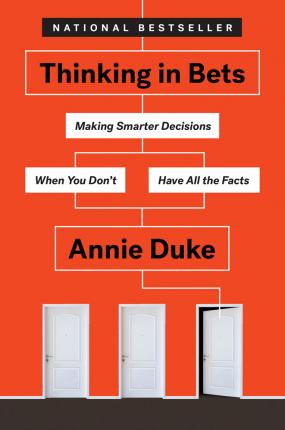
Life is a Poker, Not Chess
The first chapter talks about the outcome bias that we all might carry in analyzing decision. The bias is about equating outcome quality to decision quality. We might look at the outcome and then extrapolate that the decision behind the outcome is a good one. Similarly we can look at a bad outcome and assume that the decision process behind the negative outcome is of bad quality. In a setting like chess, the correlation between decision quality and outcome quality is high. In real life, the correlation can vary based on many factors such as luck, external factors, etc. The chapter is all about making sure that the reader can understand the difference between decision quality and outcome quality. Any outcome is dependent on decision quality that is in our control and luck, that is outside of our control. Hence any causality between outcome and decision quality must be viewed in the context of luck.
In poker, the outcome bias is called ‘resulting’, a thinking pattern that tries to make erroneous connections between results and decision quality. The games in our lives involve uncertainty, risk, deception, luck, that are prominent elements of poker. By discounting these external factors and attributing outcome to decision quality alone is an example of ‘resulting’.
The author urges to look at our decisions as bets as it gives us following advantages:
- It makes us think about the various types of outcomes possible instead of thinking in extremes
- Intuitively we have to work with imperfect information and assign probabilities to the occurrence of various outcomes
- We would also start looking at the world and approaching it with the mindset, “I am not sure”, rather than a mindset that is biased to some specific outcome
The secret is to make peace with walking around in a world where we recognize that we are not sure and that’s OK. As we learn more about how our brains operate, we recognize that we don’t perceive the world objectively. But our goal should be to try.
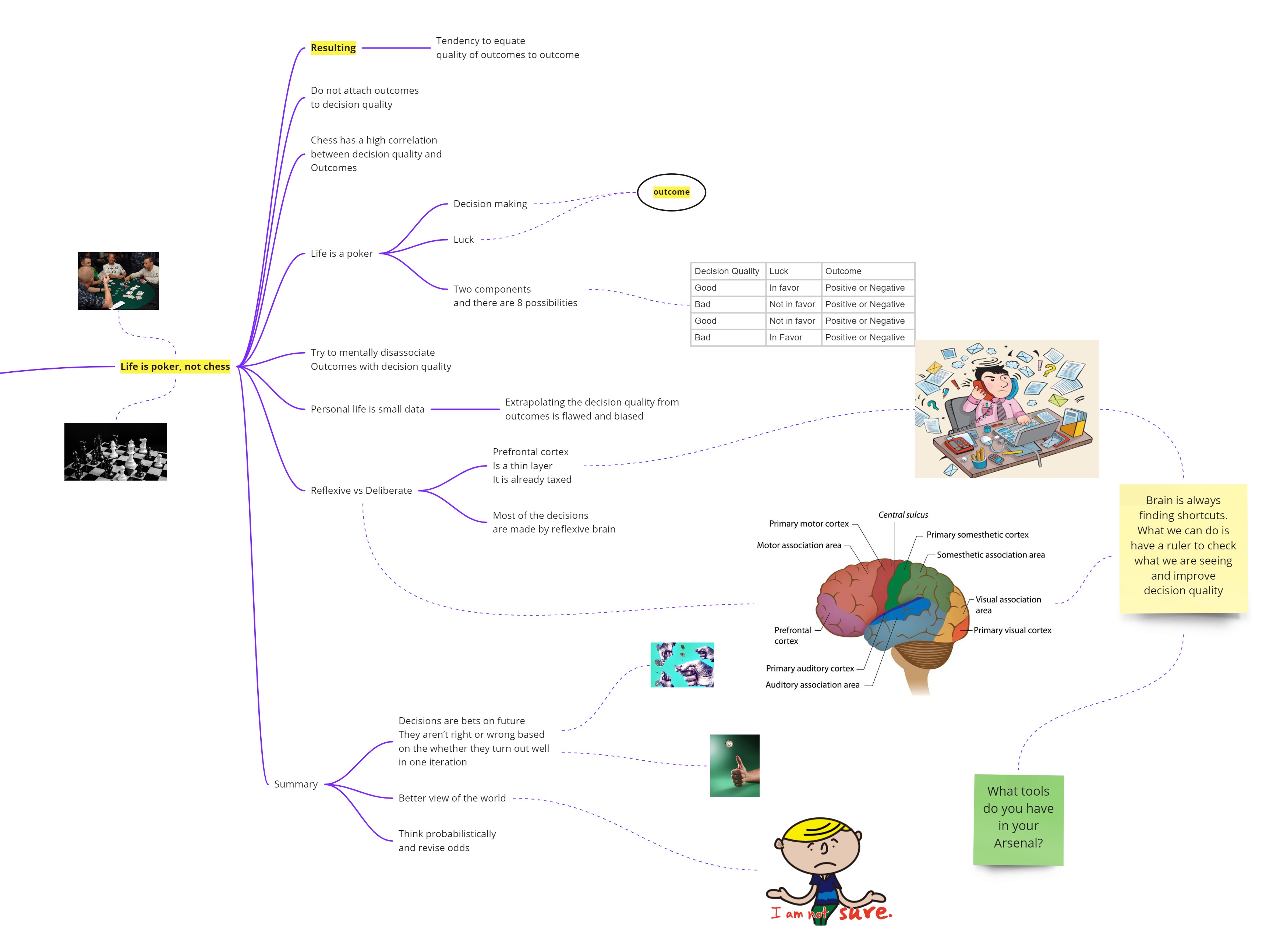
Wanna Bet
The author walks through a few real life examples in which people have incorporated betting in to decision making. One is the case of a poker player who bets with his playmates that he would relocate to another town and live there for 30 days. By explicitly creating a bet around the decision and offering it as a wager, the poker player shows us all that there is an advantage in thinking through life situations as bets.
By treating decisions as bets, poker players explicitly recognize that they are deciding on alternative futures, each with benefits and risks
The author makes a fantastic point in the context of bets in our personal lives.
One of the reasons we don’t naturally think of decisions as bets is because we get hung up on the zero-sum nature of the betting that occurs in the gambling world; betting against somebody else where the gains and losses are symmetrical. One person wins, the other loses, and the net between the two adds to zero. Betting includes, but is no limited to, those situations.
In most of our decisions, we are not betting against another person. Rather we are betting against all the future versions of ourselves that we are not choosing. We are constantly deciding among alternative futures.
We need to consider the risk and uncertainty associated with our decisions, factor in those components and then make our decision process robust. The outcome can be good or bad. But as far we are concerned, our decision making process needs to be a good quality one.
If you look at any decision making, there are a range of possible outcomes and for each outcome, one could associate a prior probability. Our experience, our open mindedness, our attitude towards the world largely decided how we calibrate our beliefs and hence the probabilities.
Part of the skill in life comes from learning to be a better belief calibrators, using experience and information to more objectively update our beliefs to more accurately represent the world. The more accurate our beliefs, the better the foundation of the bets we make.
One of the most important things to consider when we evaluate decisions is the way our brain actually does the thinking
- We hear/look/come across information
- We believe in them
- Later when we have time or when we are forced to reevaluate the beliefs, we try to vet them
Hence the natural first step is to believe the fact. That is an enormous insight in to how we actually work. Hence unless we are forced to vet our beliefs, we are forever believing in other people’s judgments.
In a sense, one must always seek out ways to vet the activity one is performing, let’s say you believe in some political commentary, some country, can you find a way to validate your belief ? Let’s say you believe that Chinese economy is going to strengthen in the next X periods, one way to validate your feeling or opinion is to place a bet in the FX markets and then see how it pans out.
If you believe that crypto might have a lot of potential, go for a bet on the space. How do you bet on the space ?
- Invest time in doing a course on it, betting that your time investment will payoff in terms of better understanding, pay off in terms of a better bet in a trade that you can do with your personal wallet ?
- Invest some time going through what other are saying for and saying against the field ? The bet is that you have a better understanding of the space that will help you calibrate your beliefs
- Put in a few trades and see for yourself whether the space looks exciting for you at a personal level
When you read something or come across something, assume that you are given a playground to bet on something. Write down your wager somewhere and then revisit at regular intervals
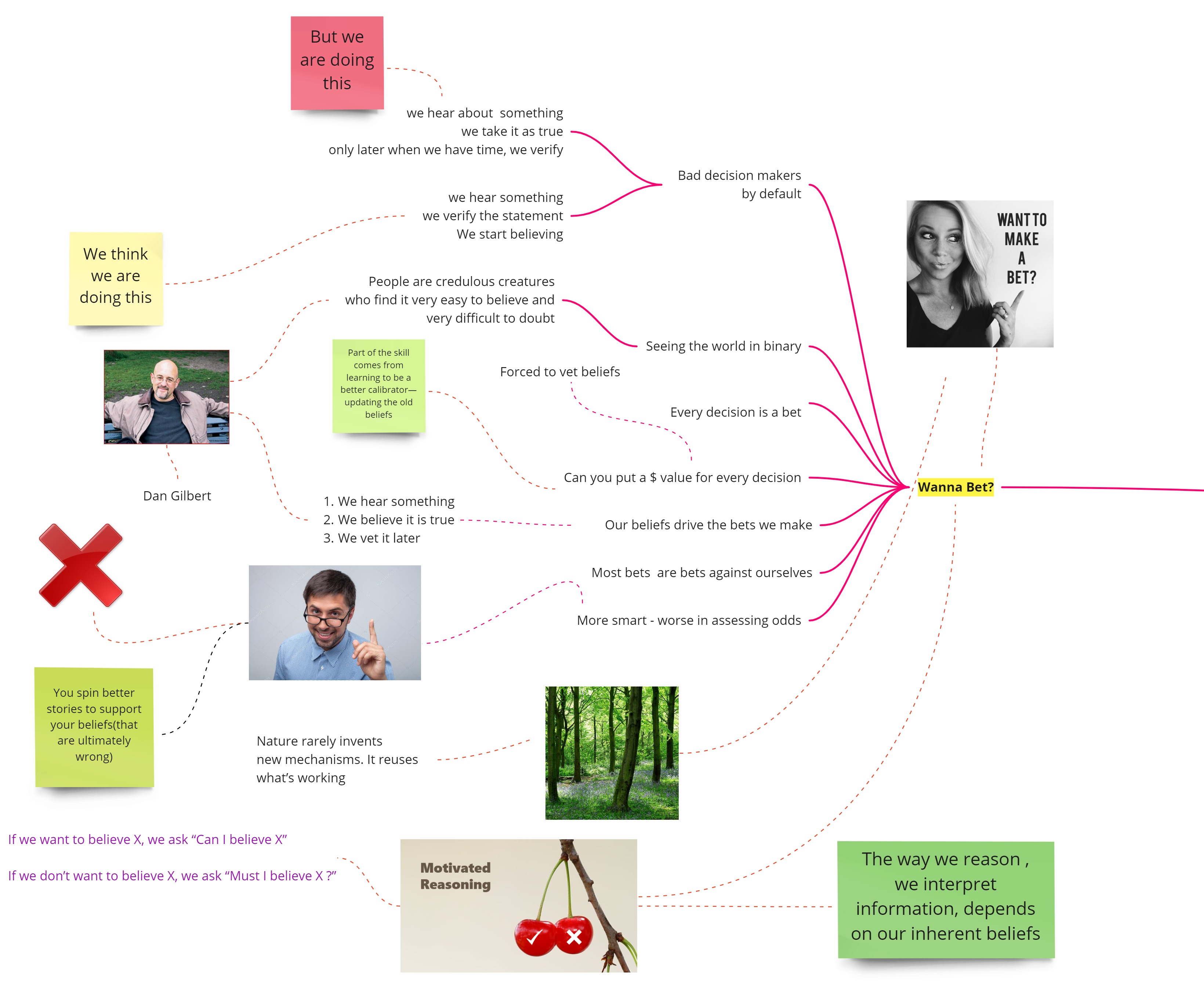
Bet to Learn
The main advantage of betting is that it gives us an opportunity to field outcomes and categorize them in to “Luck” and “Skill” buckets. Not every outcome is 100% luck or 100% skill. It is up to us to develop necessary skills to apportion the percentage contribution based on refining our belief systems. The main bias that rears its head in this context is the “Self Serving Bias”. This is the bias that blinds us in taking credit of good outcomes to our skill and offloading negative outcomes to luck.
In all activities our lives, we see a ton of outcomes based on the choices we make. It is up to us realize that we need to actively calibrate our beliefs and make note of any self-serving bias that might be cropping up.
The main idea of this chapter is that fielding outcomes needs to be done, but it is also hard. In a world where there we do not know the full information, there are all sorts of bias that creep up and make fielding difficult. But that does not mean we have to give in to these biases
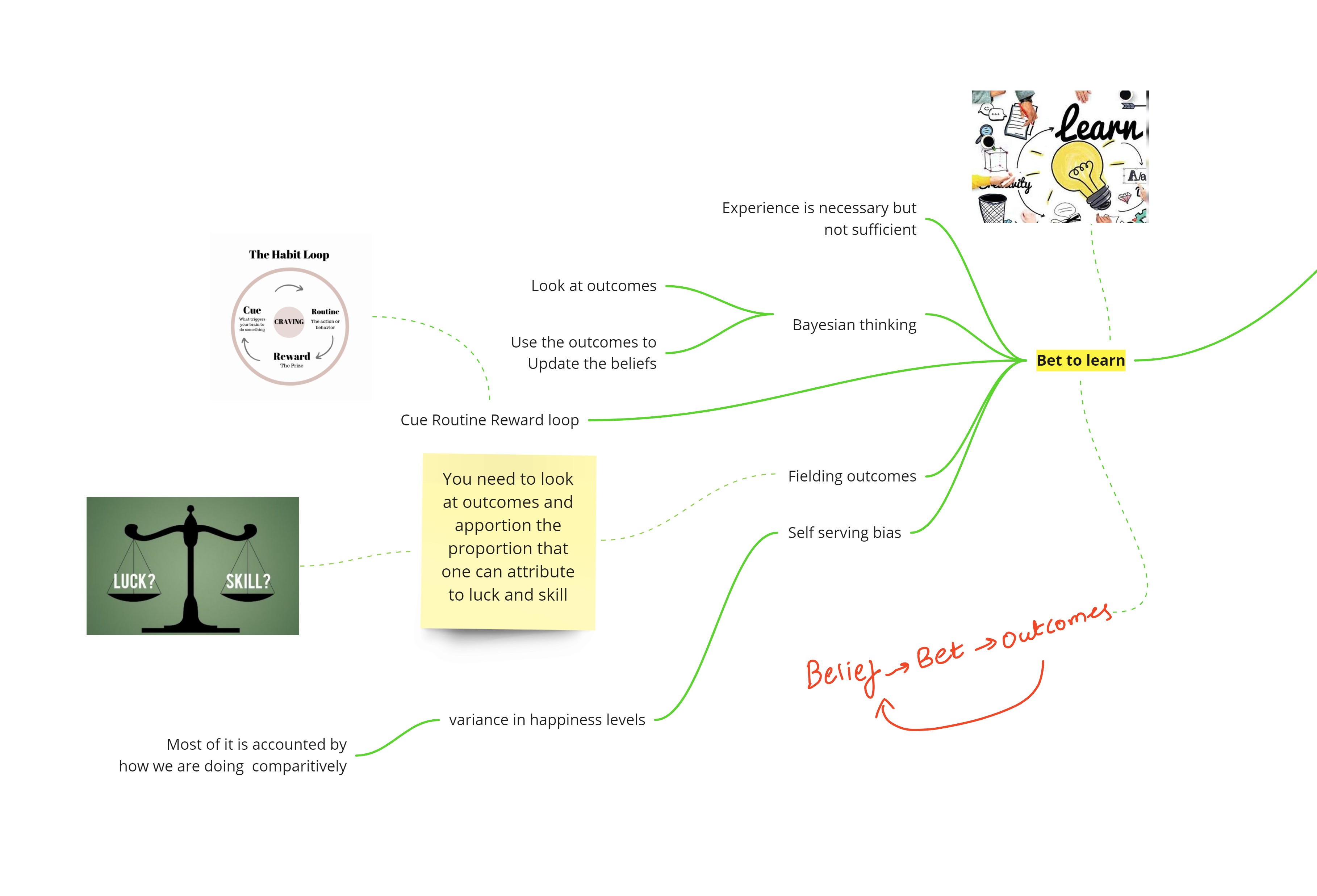
The Buddy System
The author explores the idea of using external actors, to calibrate our beliefs.
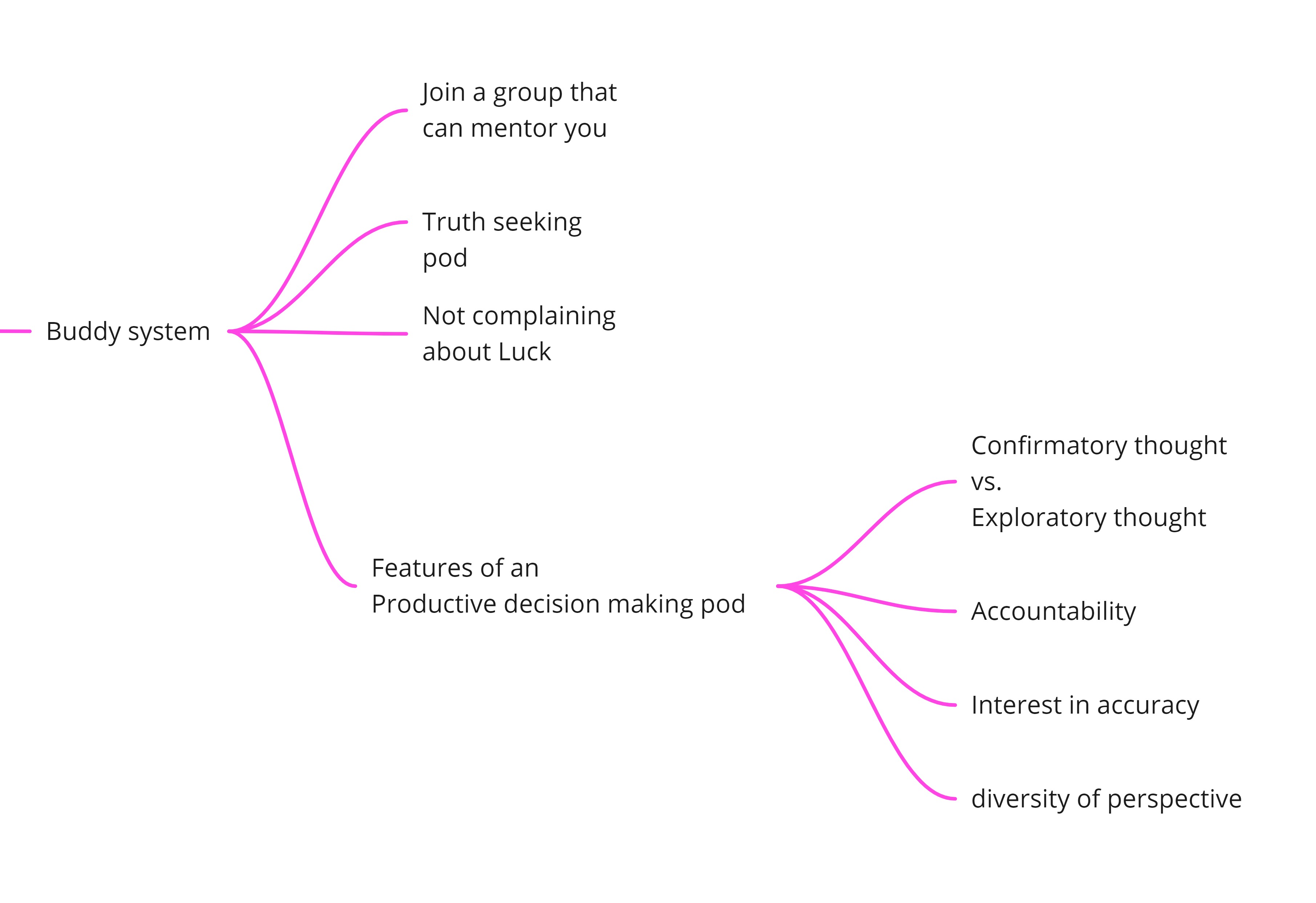
Dissent to Win
The author delves in to five principles(CUDOS) that will help us calibrate our outcomes
- Communism: Sharing data and rewarding others for giving us more information(might be against our opinion)
- Universalism: Disentangle message from the messenger
- Disinterestedness: vigilance against potential conflicts that can influence the group’s evaluation
- Organized Skepticism : discussion among the group to encourage engagement and dissent
Adventures in Mental Time travel
I found this chapter useful as it mentions almost a dozen hacks that can help anyone in the following activities:
- defining a bet
- evaluating a bet
- calibrating our beliefs
- thinking about alternative outcomes
The main idea around all the hacks is to do a mental time travel, i.e. collide past versions of us with future versions of us. I think it would be easier to do this activity if you maintain some kind of journal. You can revisit your previous assumptions, feelings and then try to imagine a conversation with your future self that you are imagining right now.
In real-life decision-making, when we bring our past or future-self into the equation, it helps present-us make better bets.
One can use past-us and future-us as buddies in aiding our decision-making process.
The following are some of the hacks mentioned in the chapter:
- Temporal Discounting: This occurs whenever we take a large discount of
something to get it now rather than later. Whenever we give in to something
and trade off time to get something far less valuable NOW, as compared to a
valuable LATER, we are indulging in temporal discounting.
- The pathways that help us remember the past are the same pathways that help us imagine the future
- Saving for retirement app - visualizing future self in an app
We are not perfectly rational when we ponder the past or the future and engage deliberative mind, but we are more likely to make choices consistent with out long-term goals when we can get out of the moment and engage out past and future selves
- Premortem and Backcasting: Premortem entails imagining a negative outcome and working out the reasons for the same. Backcasting entails imagining a positive outcome and working out the possible reasons for its realization
- TILT: Be aware of emotional hijack when taking decisions
- Scenario planning - Drawing various decision trees before taking a decision
Here is a mindmap that summarizes the hacks
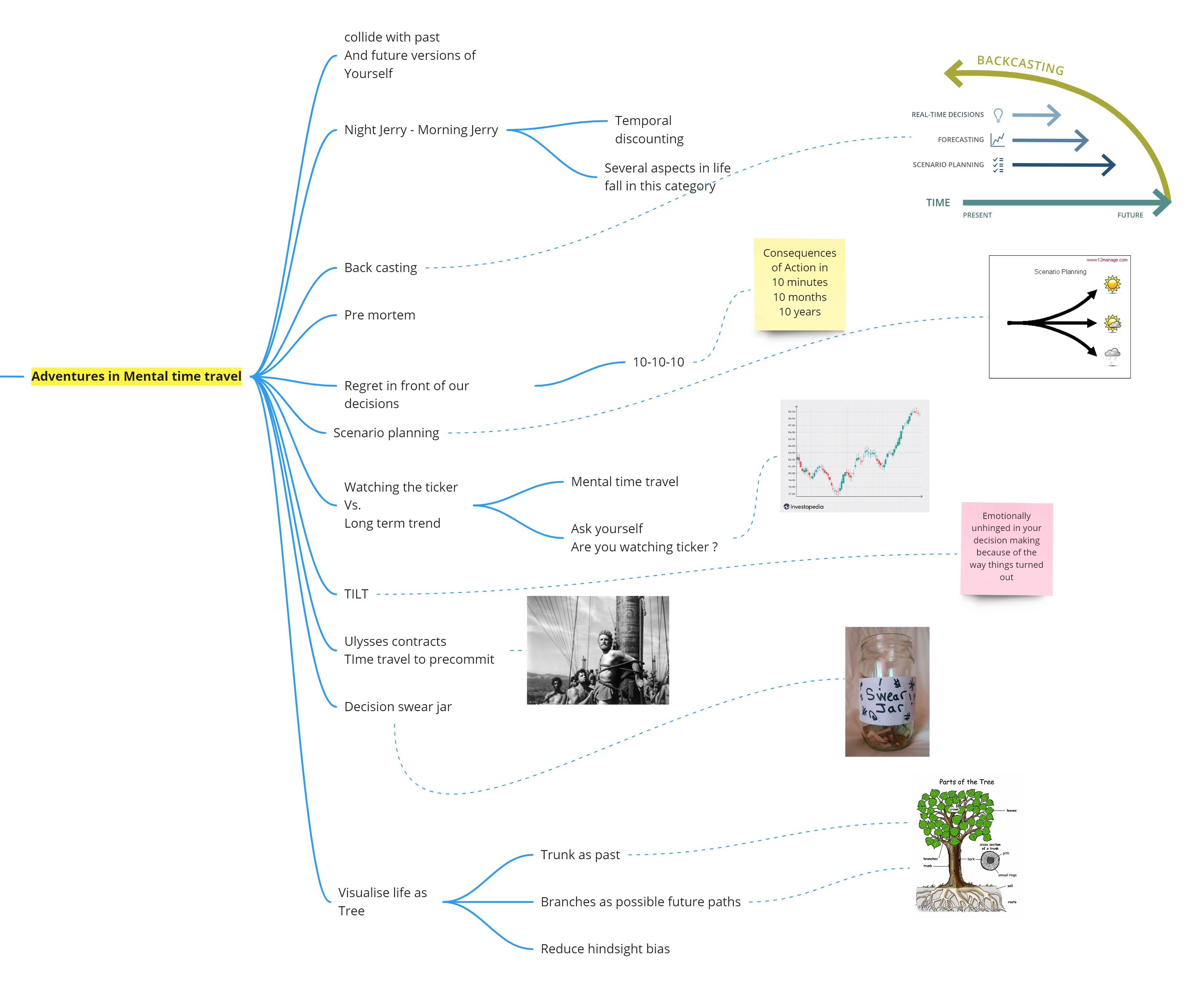
Takeaway
A great book that forces us to look at “decisions” as bets. By looking at every decision as a bet, it forces out of the existing moment and forces us to imagine the past and future outcomes. I think the book would be really useful to anyone who wants to improve their decision making skills (which means practically everyone). Definitely worth rereading the book at regular intervals so that one is constantly reminded of the importance of paying attention to all the thinking hacks, biases, mentioned in the book.